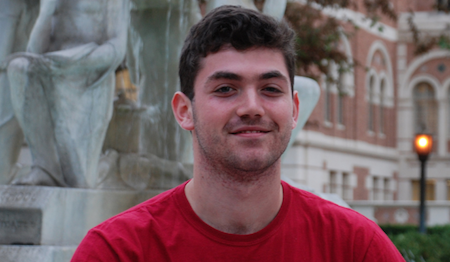
Alex Biniaz-Harris
Seventeen years after his grandmother Celina Biniaz gave testimony, Alex Biniaz-Harris is carrying on the family name at USC Shoah Foundation.
Biniaz-Harris ’15 is a music and business double major at USC and an intern at USC Shoah Foundation. Born and raised in Washington, DC, he grew up visiting his grandparents in Southern California, and during his freshman year at USC his grandmother Celina introduced him to the USC Shoah Foundation.
She gave testimony to the Shoah Foundation in 1996 about her experiences in Poland during the Holocaust, where she spent time in Auschwitz before working in Oskar Schindler’s factory as a member of Schindler’s List. Biniaz has credited Shoah Foundation founder Steven Spielberg’s film Schindler’s List with “giving her a voice” to speak about her experiences for the first time.
Biniaz-Harris has been interning with the communications team since his sophomore year. He’s currently working with social media coordinator Deanna Pitre on a social media campaign about the recent rise of anti-Semitism and anti-Roma attitudes in countries including Greece, Hungary, Sweden and France.
He said it’s important for USC Shoah Foundation to be active on social media in order to connect with younger audiences about critical world issues.
“I think it’s essential just because so many kids our age use these platforms,” Biniaz-Harris said. ”Having something like the Shoah Foundation on Facebook provides a different dimension to the whole social media experience.”
One of his proudest achievements is creating USC Shoah Foundation’s Google+ page. He also helps Pitre craft Facebook and Twitter posts inspired by themes, such as a recent weekly series about little-known heroes who helped Jews and others during the Holocaust and other genocides.
Biniaz-Harris said the most rewarding part of interning at USC Shoah Foundation is watching testimony and being able to relate the experiences of survivors, many of whom were his age during the Holocaust, back to his own life. It’s inspiring to hear how they’ve overcome the tragedies, he said, and thinks other students could also learn from their stories.
“I think most students know what atrocities happened, but hearing a personal perspective from a survivor on what it was like to witness those atrocities, step away from it, live 50 years and then readdress those circumstances, I think for students would be great,” he said. “It can make us realize how fortunate we are at our age to be where we are and have encouraging people around us.”
Biniaz-Harris, a classical pianist, hopes to work in music promotion and run his own music festival in the future. But it goes without saying that his work at USC Shoah Foundation is a source of pride for a certain family member.
“Definitely I think my grandmother is happy that I’m helping promote what this foundation does,” he said.